8 June 2022
Senka Hadzic
We held two workshops in 2022 to introduce the Ocean View community to community currencies. Ganief Manuel, who now runs the local wireless community network in Ocean View had a vision of building a community currency, to help grow the local economy in Ocean View, as far back as 2017.
Workshop 1 (February 2022)
The main objective of the first workshop was to introduce the concept of community currencies (or community vouchers) - and for that purpose we invited Tim Jenkin from the Cape Town Talent Exchange (CTTE) to talk about his experience. Will Ruddick joined us online and shared his story, some stats on Sarafu, and experiences working with communities across Kenya. Ganief Manuel from Black Equations talked about the network rollout, and the potential of the iNethi platform in OV. To avoid the ire of the banking institutions in South Africa, we decided to rather use the phrase "voucher" as "currencies" imply that we are creating a new money system.
Community inclusion voucher workshop
Lekker is an Afrikaans work meaning pleasing or enjoyable or tasty
What if there was a local voucher that would enable businesses in Ocean View to trade without using money. A voucher that you could use to barter goods and services in your community and support more local businesses in Ocean View. You’ve probably used a shopping voucher that you can use at any shop in a shopping center, the same voucher idea could be used across the whole of Ocean View.
Besides our team and guests, there were 12 participants from the Ocean View community. After some ice-breaking activities, we performed a resource mapping exercise trying to understand how much of their weekly groceries people tend to buy outside of Ocean View, and how much in local shops. The rough estimate is just as we had predicted: more than 80% of wealth leaves the community.
We also tried to map out what is already there in the community in terms of goods and services (hairdressers, people to wash your cars, housekeepers, graphic designers, plumbers), and what is missing (food producers, someone to fix printers and electronics, someone ironically said ‘police’). We learned that there is already some form of bartering taking place in the community. People are informally trading fish for salt, handmade jewelry for games, providing plumbing services in return for fixing things, sometimes there is the need to exchange mobile data for prepaid electricity.
A strong argument for using the community currency/ voucher is the safety aspect: OV is unfortunately one of the least safe communities in the wider Cape Town area. Robberies are very common, and once cash gets stolen it can easily be spent instantly - which is not the case with community vouchers. Overall, the concept has sparked interest among community members, and in the second part of the workshop our guest speakers presented their work.
While there is lots of similarities between Grassroots Economics and CTTE work, there are also some key differences:
- When joining the network, every Sarafu user gets dropped an amount to start trading with. On the other hand, CTTE users start with zero, but can go in debt up until ZAR 400 (ca. 25 USD). A small levy (1% per month) is charged on debt, to avoid users staying in debt.
- Sarafu network went digital in 2016, and started using blockchain in 2018 where all transaction records are kept securely. It is a real-time trading system, whereas CTTE has an online platform where people advertise what they offer and what they need. It has a trading and banking function, keeping record of transactions - however much of it happens offline and it is a somewhat slow bartering system.
- Sarafu vouchers lose value over time, to prevent people from hoarding. ‘Talents’ don’t have that feature, however if one accumulates talents but doesn't spend them in the community, they are not rich.
Tim Jenkin pointed out that he tried rolling out CTTE in townships, and one reason why it didn’t take off was probably the lack of internet - but would be keen to giving it a try in OV, especially coupled with the iNethi platform!
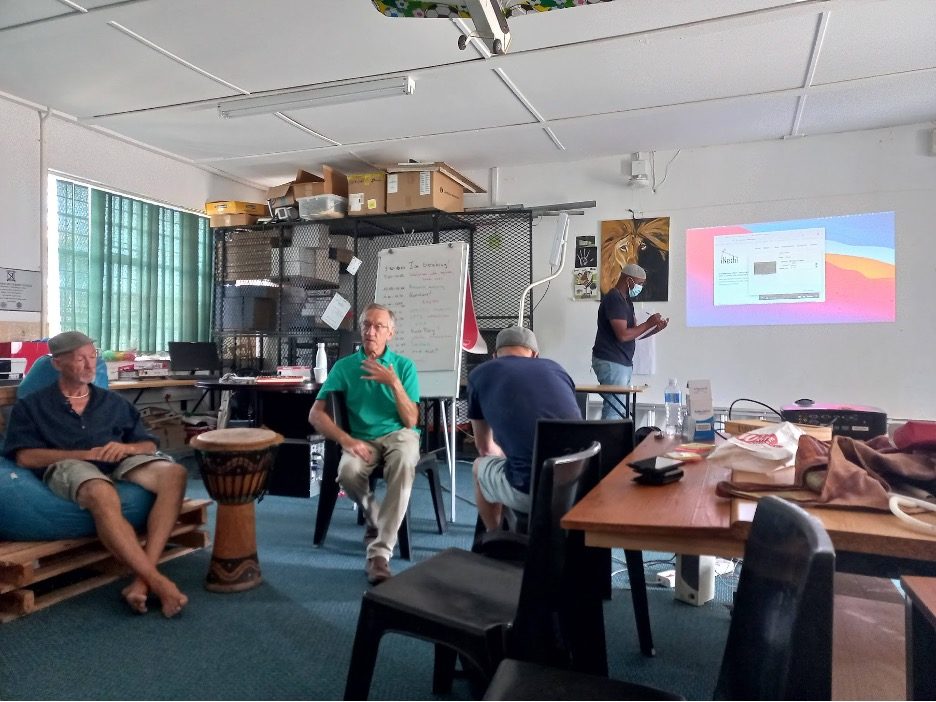
We moved on to a role play where each participant was given an amount of beans representing the same amount of community currency. Each participant decided what type of goods or services they want to sell. The goal of this exercise was to realise that having lots of beans after trading does not make anyone rich - ideally every trader would have more or less the same amount of beans before and after trading.
Finally, we brainstormed what to call the future community currency: Krone is the name for OV coin! Following the workshop, we noticed that “Krone” is already a phrase that is used for having cash.
Quotes :
“People outside only know about the bad things happening in OV. But there are some amazing things happening here!”
“People don’t realise how much power their money has, even if it’s very very little.”
Workshop 2 (May 2022)
For the second workshop, which happened three months later, we wanted to make sure to invite people who either have a small business, or are open to the idea of starting one. We asked people to sign up explaining why they are the best person to attend this workshop. 15 applications were received, and we additionally invited a couple of participants from the first workshop, whom we identified as potential users of Krona - the OV community voucher.
Participants shared their concern with local issues such as unemployment and lack of safety, and the desire to ‘have their old Ocean View back’. Resource mapping revealed that community members are willing to offer the following goods and services in exchange for Krone: dance classes, baby-sitting, compost making, jewelry, tutoring, house cleaning, sewing, vegetable gardens, and offering internet access.
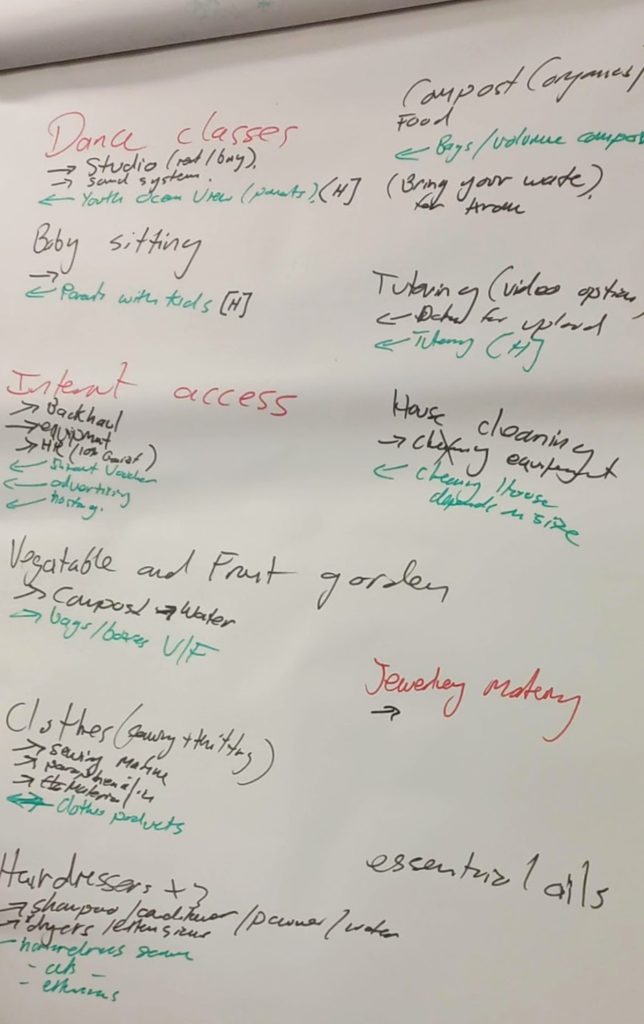
After the ‘bean game’ from the first workshop, we also introduced one with strings, where each string link represents a purchase from somebody. In this game, there is a visual ‘record of transactions’ so it becomes clearer which trader had the most valuable goods/ service.
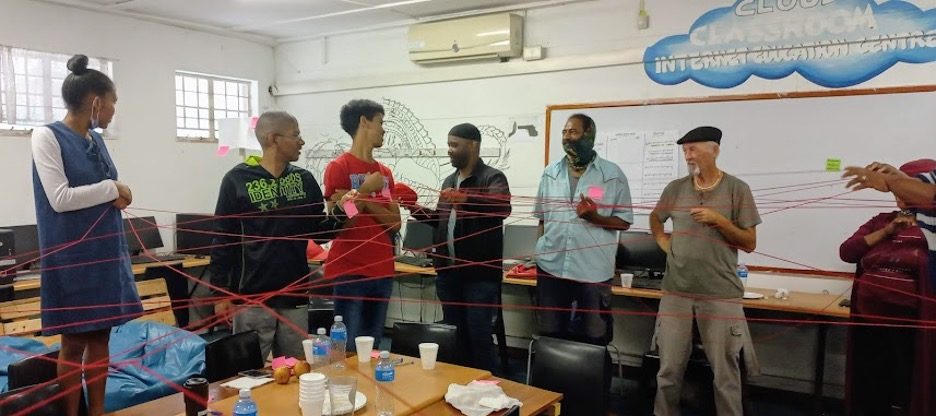
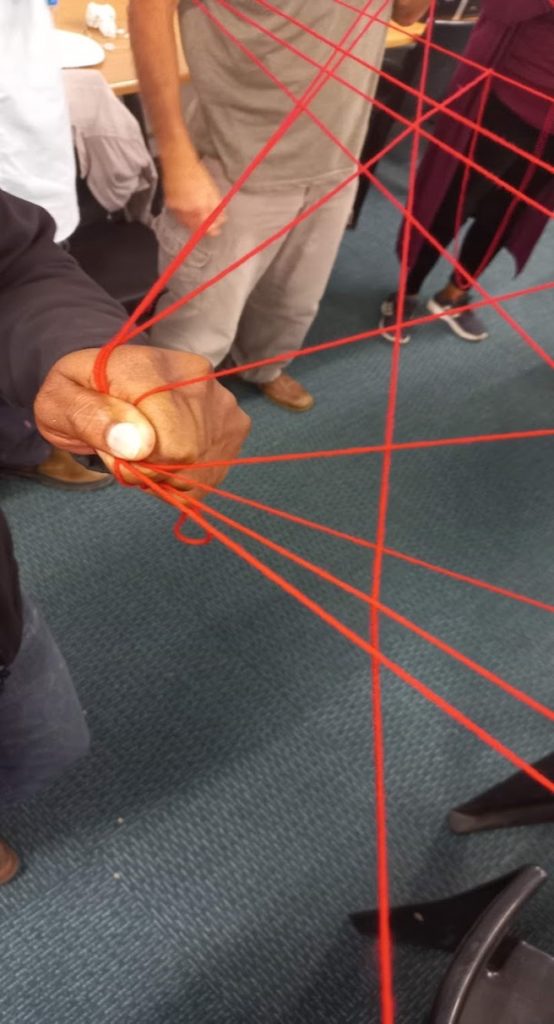
Internet access was one of the most desired services! What surprised us, however, is that workshop participants were not aware of the fact that iNethi usage is free – even though most of them had heard about the platform before. More outreach is definitely needed.
We also did a little demo on the use of USSD to transfer custom amounts of CIC from one user to another.
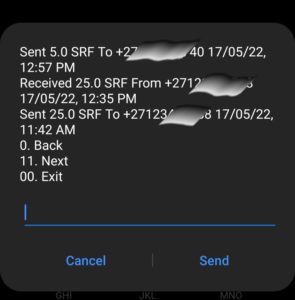
One of the upcoming activities will be the Krone logo contest - and the winner receives the prize in Krone!